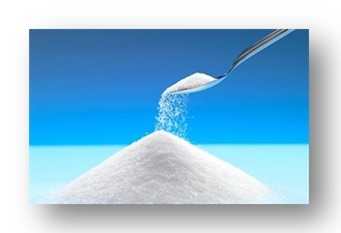Fact or Myth?
What is Sugar?
|
(source : Blog Yan) |
Sugar is also known as simple carbohydrate. Most of the energy that our body need comes from carbohydrate. It can be separated into two types based on its chemical structure and that is simple and complex carbohydrate. Many people are still confused about the differences between simple and complex carbohydrate. Simple carbohydrates or simple sugars will be broken down and digested very quickly. They mainly contain refined sugars and very few essential vitamins and minerals. Under simple carbohydrates are monosaccharide and the disaccharide groups. Public is used to the word “sugar” as cane sugar. It was first used by men in Polynesia from where it spreaded to India in 510 BC. It is now produced in 121 countries and global production now exceeds 120 million tonnes a year. Cane sugar is widely used to bring sweetness to the food and drink. The white stuff that came from cane sugar is called sucrose. |

The above figure shows the classification of carbohydrate. Sucrose is listed under simple carbohydrate and will be broken down to produce glucose and fructose. Glucose also known as the blood sugar in relation to diabetes.
The ‘Hidden Sugar’
Sugar can come in many forms. You may think you are eating sugar-free foods but there is hidden sugar in the ingredients that can still contribute to calories. If you have diabetes, reading food labels is an important skill. The Food and Drug Administration allows only three sugar-related claims – “sugar-free,” “no sugar added” and “reduced sugar” or “less sugar.”
|
Sugar is listed under total carbohydrates on a food label, but you will need to check the ingredient list to know where does the sugar in the food item comes from. It may use the word “sugar”, like brown sugar, sugar cane, or just simple sugar. Also, it may be in the form of “syrup”, example, corn syrup, high-fructose corn syrup, maple syrup and glucose syrup. Sometimes, it may be in the word that end in “–ose”, like sucrose, glucose, lactose and fructose. |
|
How Does Sugar Related To Obesity?
All sugar contains 4 kilocalories per gram, and so is all carbohydrates. Every teaspoon of sugar has 16 kilocalories. Sugar has long had a bad reputation, especially among people with diabetes.
|
60 kcal = 1 desert spoon heap = 1 tablespoon level = 3 sugar cubes |
 |
Sugary foods can contribute plenty of calories as it is an ingredient to many favorite foods such as ice-cream and chocolate ; Furthermore, foods that is high in sugar is often high in fat such as traditional Malaysian deserts. On the other hand, high sugar drinks provide empty calories especially soft drinks.
Sugar taken in excess will contribute to excessive calorie intake. Excess calorie over the long-term can lead to weight gain. It happens when people eat too many calories and does not balance them with calorie output or exercise. The excess calories are stored as fat.
It is natural to suspect sugar as one of the contributors to weight gain. Along with overweight and obesity, the risk of chronic diseases will greatly increase such as type 2 diabetes mellitus.
What is Diabetes?
Diabetes is a disease where sugar levels in the blood is persistently high and overflows in the urine.
Blood sugar is presented as glucose in which the tissues such as brain and muscle will use it for energy.
What Causes Diabetes?
There are a few types of diabetes ; the most common is type 1 and type 2 diabetes.
Type 1 diabetes is caused by genetics and unknown factors that trigger the onset of the disease. In most cases, the insulin is not able to work properly at the cells and tissues. It is caused by the insulin receptors being abnormal causing insulin resistance, a metabolic defect which is inherited.
Type 2 diabetes is caused by genetics and lifestyle factors. This diabetes is inherited and caused by insulin resistance and it is closely associatied with obesity. The insulin resistance was initially overcome by excess production of insulin by beta cells of pancreas.
Does Eating Too Much Sugar Causes Diabetes?
No, eating too much sugar is not a direct cause of diabetes. There are several causes of diabetes but none of it reported that sugar is one of them. However, obesity is one of the important contributors to diabetes. Eating too much sugar can be a major contributing factor which lead to obesity, of which is a risk-factor to diabetes. So, eating too much sugar may lead to diabetes indirectly.
In order to keep away from diabetes, it is important to control our weight to an ideal level. This is because overweight has clearly promoted diabetes and it is tenfold the risk for those with family history of diabetes.

Conclusion
Being overweight has an increased risk for developing type 2 diabetes, and a diet high in calories, whether from sugar or from fat, can contribute to weight gain. Therefore, those who have family history of diabetes are recommended to manage their weight.
References :
- American Diabetes Association (2012). Diabetes Myth. Retrieved September 21, 2012, from http://www.diabetes.org/
- WebMDvideo. (2012) Does Eating Sugar Cause Diabetes? (Video File). Video posted to http://diabetes.webmd.com /
- Marianne W. (2010). Does eating sugar cause diabetes? Retrieved September 21, 2012, from http://www.besthealthmag.ca/
- Malaysians’ Dietitian Association. 2005. Medical nutrition therapy guidelines for Type 2 Diabetes.
| Last reviewed | : | 10 January 2014 |
| Writer | : | Mdm. Salha binti Mohamed Nor |








